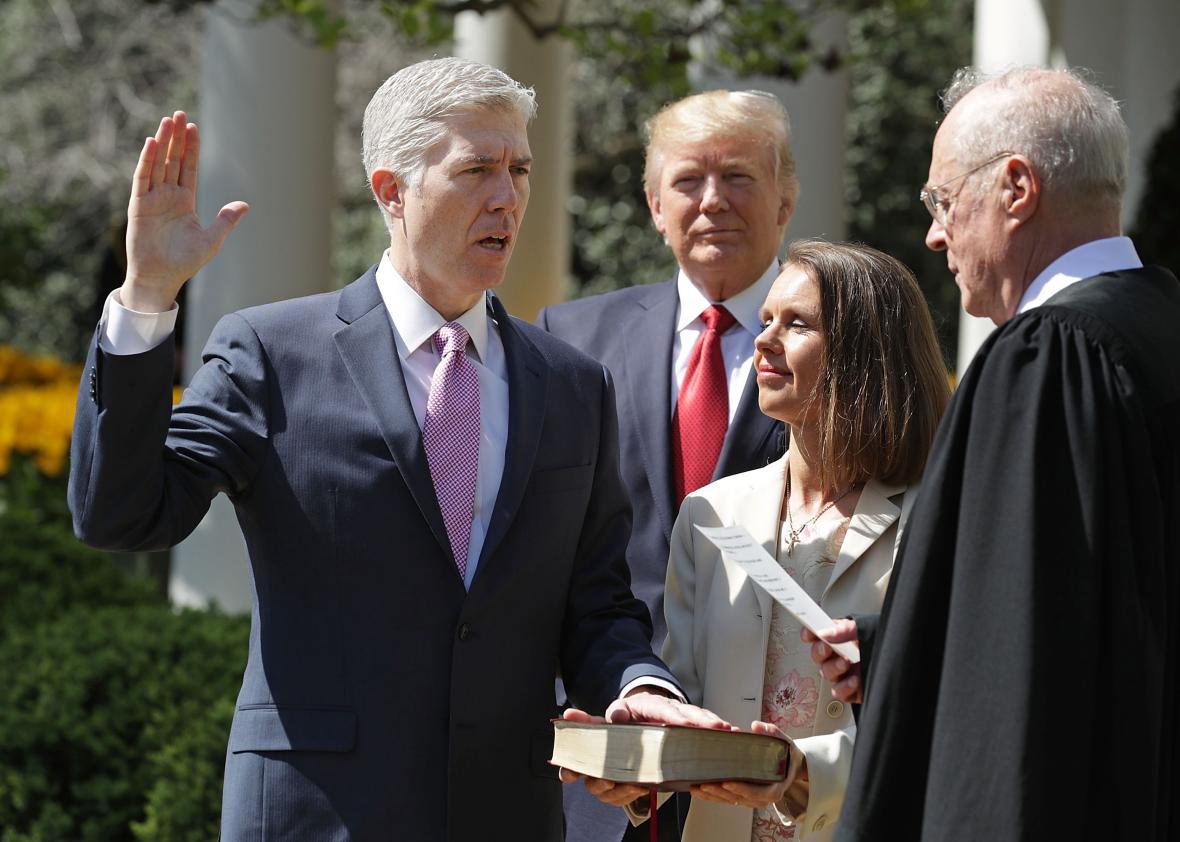In his first week on the Supreme Court, newly sworn-in Justice Neil Gorsuch—an avowed defender of religious freedom—will hear oral arguments in Trinity Lutheran v. Comer. The important religious liberty case asks whether the First Amendment’s Free Exercise Clause compels states to provide public money directly to churches.
The facts of the case are as follows: A Missouri program offers grants to help nonprofit organizations purchase rubber playground surfaces. Trinity Lutheran Church, which operates a preschool out of its church facilities, applied for a grant through the program but was rejected under a provision in the state constitution prohibiting state money from going “directly or indirectly, in aid of any church, sect, or denomination of religion.” The church sued, claiming the state’s denial constituted an unconstitutional burden on its free exercise of religion. Both sides in the case argue disastrous consequences will follow if the court rules against them. Religious groups contend that important social services, such as soup kitchens and women’s shelters, will be forced to shut down if Trinity Lutheran loses, while the state’s supporters caution a win for the church will erode the wall between church and state.
Holly Hollman is general counsel for the Baptist Joint Committee for Religious Liberty, a faith-based organization with the mission of “defending the first freedom of the First Amendment by protecting both the free exercise of religion and defending against its establishment by government.” On this week’s episode of Amicus, Hollman joined Dahlia Lithwick to discuss the amicus brief she filed in the case, which argues that religious institutions are actually freer if they are barred from accepting government funds. Hollman’s comments have been condensed and edited.
On whether the Supreme Court took this case to rule in favor of the church:
That’s definitely our concern. It is surprising, because to us this case is very similar to Locke v. Davey, which the court decided by a 7–2 margin in 2004. In that case, the court upheld the state of Washington’s decision not to fund the training of ministers via a publicly funded scholarship program. Likewise, here, Missouri has just as valid an interest in protecting against state funding of religion. So yes, we were concerned when they took this case, but I’m hoping that on a closer look, they’ll see that, again, states have a valid and historical interest that does not in any way keep Trinity Lutheran or any other religious group from the free exercise of religion.
On why separation of church and state does not equal religious discrimination:
It is interesting that you would have a Christian church in Missouri arguing that the state is hostile to its interests. Just sociologically, I don’t think that really works. Trinity Lutheran and some of its friends on that side are arguing that this is somehow anti-religious, and they point to a time in American history where there was a lot of anti-Catholic sentiment after a time of immigration, and there were changes in some state constitutions to have particular provisions that would prevent money going, specifically, to religious schools. But there’s not much of that in Trinity Lutheran, because the Missouri provision that prevents state aid from going to churches dates back to 1820, so that’s way before this rise in anti-Catholic sentiment.
On the current fights over religious freedom:
These fights over the boundaries of free exercise in a commercial context are so difficult, and they are really dividing us religiously and politically. The fights about the religious rights of corporations and contraception in Hobby Lobby and Little Sisters of the Poor really get to the heart of, How do you take your religion into the sphere beyond your church, and how you still can respect the rights of others? This case, to me, seems so different. We can fight about whether or not a corporation has religious rights or if you have the same kinds of religious rights once you’re out there selling your goods and services. But surely we can all agree that houses of worship represent central, core expressions of religious freedom for all, and they should be protected in special ways. The Constitution itself treats religion in special ways, so this idea that it’s wrong to treat religion differently just really flies in the face of our constitutional tradition. If we start at the core and say, “Let’s protect religious expression of the individual and the church level,” we at least can build some common ground. And then, moving out from there, there are these more difficult cases about where we have conflict between those religious interests and other interests. And we can work those out, and it’ll take a long time. In this case, we should take a deep breath and look at really what’s at issue here. I think it’s just the idea that religion can be and should be treated in special ways, and that Missouri has drawn a bright line, a legitimate line, in order to protect that interest.
To hear Lithwick’s whole interview with Hollman, subscribe to Amicus.
